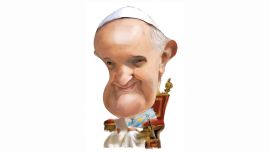A far-right fiscal conservative and a left-wing former student activist will vie to become president of Chile next month, two years after anti-inequality protests that set the country on the path to constitutional change.
José Antonio Kast, 55, and Gabriel Boric, 35, took a convincing lead over five rivals in a first voting round Sunday to pass to the run-off on December 19.
Kast of the far-right Republican Party took almost 28 percent of the vote, according to a near-complete count, followed closely by leftist lawmaker Boric of the Approve Dignity alliance with more than 25 percent.
The next closest candidate, Franco Parisi of Partido de la Gente, managed less than 13 percent.
In an address to jubilant supporters, Kast vowed to restore "peace, order, progress and freedom" in response to what he said was a clear call "from a majority of Chileans."
Boric, for his part, vowed to work for "unity," telling supporters: "We did not take to the streets for everything to remain the same."
Sunday's poll came two years after dozens of people died during weeks of demonstrations against low salaries and pensions, poor public health care and education, and in the words of a recent OECD report, "persistently high inequality" between rich and poor.
The protesters demanded a new constitution.
The government finally agreed to a referendum, which one year later gave the go-ahead for a new founding law for Chile to be drawn up by an elected body.
Order vs change
Sunday's election continued a recent rout of traditional political parties in charge of decades of neoliberal policy credited with Chile's relative wealth but blamed for its social inequity.
It started with elections for a new constitution-writing body in May that saw voters rejecting established parties and opting in large part for independent, left-leaning, candidates.
Kast and Boric are both from minority parties not in government and not part of the coalitions which have governed Chile since the exit of dictator Augusto Pinochet 31 years ago.
With half of the country's 15 million voters said to be undecided ahead of Sunday's ballot, it was seen as the most wide-open presidential contest in decades.
Centrists, including the candidate from unpopular President Sebastián Piñera's party – Sebastián Sichel – proved the least popular.
"On one hand, Kast represents the restoration of order and returning to before the social explosion [of 2019], but with an even stronger hand," analyst Rodrigo Espinoza of the Diego Portales University told AFP.
On the other, "Gabriel Boric represents the deepening of political reforms" as demanded by demonstrators.
'We are bored'
On Sunday, the country of 19 million people also voted to replace the 155-member Chamber of Deputies and almost two-thirds of senators for a new-look Congress.
"We have to vote, the country needs changes," said voter Felipe Rojas, 24. "We are bored with the same politicians."
For Cristina Arellano, a 42-year-old accountant, it was imperative to vote "to turn the page on the division and trouble in the streets."
Boric, who has promised to install a "welfare state" if he wins, cast his vote in his native city of Punta Arenas in Chile's south, saying: "May hope win out over fear."
Rival Kast has expressed admiration for Pinochet, opposes gay marriage and abortion, and campaigned on restoring order and security.
His second, non-consecutive term beset by economic and social upheaval, billionaire Piñera approaches the end of his mandate with record-low approval.
The country's economic woes have worsened with the coronavirus epidemic, amid high unemployment, inflation at six percent and skyrocketing government debt as demand for social aid and subsidies exploded.
One thing is clear: many Chileans want a more interventionist and socially minded government, better access to public healthcare and education, and changes to the pension system, which is privately administered.
But analysts have also observed a recent rightward swing attributed to sometimes violent protests – also due to growing concerns about immigration and crime.
The second round, said political scientist Marcelo Mella of the University of Santiago, will be marked by a "rhetoric of fear.
"It is going to be a choice of one fear against the other. The fear of a left-wing Boric candidacy not able to respond to the [economic] problems facing the country today or the fear of an ultra-conservative leadership with Kast that will severely damage the pluralism that a democracy should have."
Next year, during the term of the new president, Chileans will vote in a mandatory referendum to adopt or reject a new constitution.
related news
by Paula Bustamante, AFP























Comments